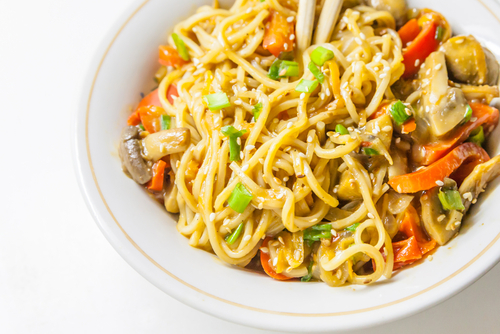Short answer
Egg noodles are not bad for you—but they’re not good for you either. They are low in fat and moderate in protein, but they contain less dietary fiber than traditional pasta and are also somewhat high in cholesterol.
Recommended Alternative
Long answer
If you’re looking for a healthier alternative to plain old pasta, you might consider egg noodles. The name alone sounds like it’s a healthy choice—everyone knows eggs have many beneficial qualities, right? However, when it comes down to actual nutritional value, egg noodles are not all that different than ordinary pasta.
A one-cup serving of egg noodles contains around 221 calories once cooked. Within that serving, you get about three grams of fat, a single gram of saturated fat and no trans fat, which is decent. According to the American Heart Association, high-fat diets can cause arterial plaque, increasing your risk of heart disease. For this reason, your recommended daily intake should be no more than 35 percent of the calories consumed that day. Saturated fat is even more of a concern, and should not exceed seven percent of your daily diet.
Egg noodles also contain around seven grams of protein and 40 grams of carbohydrates per serving. That’s close to the same ratio offered by ordinary pasta. However, egg noodles only offer two grams of dietary fiber—which is not much. Fiber is essential to digestive health, maintaining a healthy weight and has even been shown to help prevent certain types of cancer. Wheat pasta varieties offer up to six grams of dietary fiber, which is approximately 25 percent of the daily recommended intake.
When it come to cholesterol, egg noodles also tend to under-perform traditional pastas. A single serving of cooked egg noodles carries 46 milligrams of cholesterol, which is about 15 percent of the daily recommended intake—just for the base portion of one meal.
Unfortunately, egg noodles are also rarely ever gluten-free. They are made from a blend of wheat, which means they should not be consumed by those with Celiac disease or gluten intolerance.
There are a few noteworthy perks to egg noodles. For one, they have a relatively low Glycemic Index (GI), meaning you’ll have better, more sustainable energy without high blood sugar spikes followed by an unpleasant crash. Additionally, egg noodles do contain a few various vitamins and minerals: B vitamins, calcium, and iron. However, the nutritional content of these is relatively low. For instance, egg noodles only offer up to six percent of your daily recommended iron intake.
So should you switch to egg noodles? It really all comes down to a matter of personal preference. There are no huge advantages to choosing egg noodles over traditional types of pasta. If you’re looking for a healthier noodle, you should seek out whole wheat, quinoa or vegetable-based varieties instead.
Possible short-term side effects
- bloating
- pain
- diarrhea
Possible long-term side effects
- increased blood pressure
- increased cholesterol
- weight gain
- heart disease
Ingredients to be aware of

Benefits
- low in fat
- low gi
- contains protein
Our Wellness Pick (what is this?)
Organic Wide Egg Noodles
- USDA Organic certified
- Non-GMO ingredients
- Rich in protein
- No artificial preservatives
 Approved by
Approved by 









.png)





